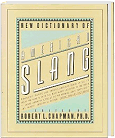

| Book of the Month | ||
 |
New Dictionary of American slang |  |
Publisher: Harper & Row
Author: Robert Chapman Ph.D
$51.00
ISBN 0-060181157
A frustrated student once remarked to me 'I understood every word that you just said to me, and nothing of the meaning of the sentence'. The reason for his incomprehension was that I had used colloquial English, where the meaning of the phrase had little to do with the meaning of the words in it. What happened with this student also happens to anyone who has watched a TV production designed for an American audience. At some point there's a sentence along the lines of 'Watch him knock back some mountain dew and you'll see why his monicker is paper belly'. (Translation: Watch him quickly drink some illegally brewed liquor, and you will see why he has a nickname which means 'someone who cannot handle the taste of strong alcohol'). Any non-American watching a programme loaded with such slang really needs a dictionary to keep up. And such a dictionary exists. It is the New Dictionary of American Slang by Dr Robert L. Chapman, a US academic who has spent a lifetime studying English as it is spoken in the USA - or 'this side of the pond' as American slang would have it.
The book starts with an introduction and a preface. As might be expected of a book written by a professor, both of these are very academic in their style, and attempt to define why slang is different from jargon, and which linguistic groups various slang words come from. It also points out that slang is more likely to use insluting expressions than polite ones, and mentions that there are many words for a badly-behaved young woman (bozette, tramp etc) but few for a well-behaved one. This review copy of the book shows its age in not giving 'Sandra Dee' for the latter, though this may have been corrected in later editions.
After the preface there follow 485 pages of words and their definitions. There are no illustrations. Each definition also gives the origin of the word where this is known. For example it gives the definition of a gangster's girlfriend as a 'moll' saying that the word comes from English in the 1700s, but does not mention that the word ultimately derives from 'moglie' (pronounced 'mol-yeh', meaning 'wife') in Italian.
A useful feature of the dictionary is that it tells us when a particular slang word was fashionable and if it is now out of date. So showy clothes worn to a club or a party changed from a 1930s 'zoot suit' to the 1960s 'glad rags' to modern 'dunta-dunts'. Incidentally a 'Salmo Dinner Jacket' is a lumberjack shirt named after the town Salmo in the mountains of British Columbia, Canada. Checking some words can also help to clear up confusion. To the British 'Scouse' means from around the area of Newcastle. In American slang Scouse is a poorly-prepared meal. Likewise a 'turkey' and a 'penguin' are not only birds but are also respectively something that underperforms badly and a member of the air force who is not a pilot.
Who is this book for? Anyone who is occasionally confused or bamboozled by American slang will find this book useful, and it is also fun to dip into for zingy new expressions. (You will find some real doozies!) On the other hand, most slang expressions these days can be looked up for free on online websites such as the Urban Dictionary. Parents should note that Dr Chapman's dictionary is comprehensive, and therefore includes both taboo language and apparently innocent expressions which are slang for some hair-raising sex acts. Use with caution.
Verdict: Good, but outdated by the internet
Assessment 7/10